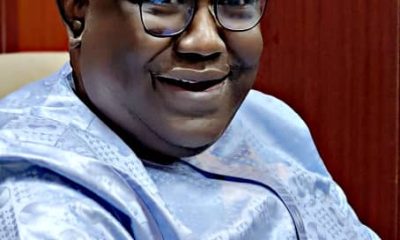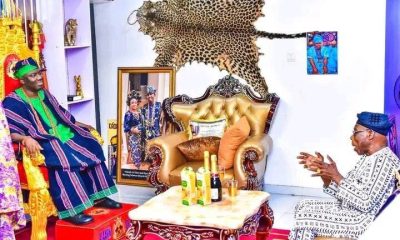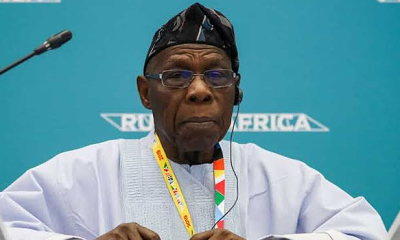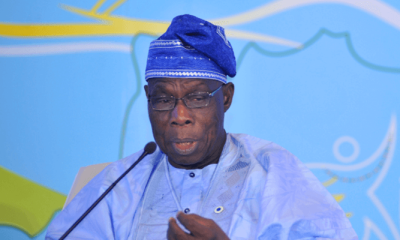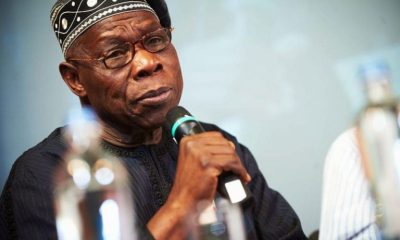Opinion
Obasanjo’s Bode Thomas Discourtesy To Oyo Obas By Festus Adedayo

The social and cultural setting in Yorubaland literally exploded last Friday. It almost took the shine off the Oyo State government’s highly commendable inauguration of a 34.85 km Oyo-Iseyin Road and the completed Ladoke Akintola University of Technology, Iseyin Campus. The highly disputatious ex-Nigerian president, Olusegun Obasanjo, was in his usual sabre-rattling element. At that event, he tongue-lashed Yoruba Obas in the most irreverent display of gross disdain for the traditional stool and institution. As I write this, an inclement anger of the people, like a vulture, is feasting on Obasanjo on the social media. He is minute by minute lacerated with all manner of irreverent words. A group from Iseyin, where the tongue-lash took place, even declared him persona-non-grata in the Oke-Ogun area of Oyo State.
The unkindest epithet given to Obasanjo as comment on his Iseyin discourtesy to the Obas is the ar’obafin – disrespecter of the monarchy. It reminds me of Alukoro, a Yoruba movie starring Fuji singer, Saheed Osupa; a man who, to me, sings as if he is an incarnate of my musical idol, Ayinla Omowura. Osupa laces his songs with an effusion of language, culture, depth and native wisdom which all answer to the profound musical calling of Omowura. In the movie, Osupa had played the role of Pela, a village bard. Strapping his agidigbo round his neck, with the musical instrument protruding on his belly, the flick began with him instigating townsfolk against an Ajisafe who he alleged had an incestuous liaison with his daughter. In rousing them up, Pela lectured the people on the boomeranging effect of silence to evil – “t’a ba ni ko kan wa, yi o kan eni ti o kan, ti o pada wa kan wa”, he counseled.
Then, a scene in the movie shifted to the palace. The whole village was in attendance, as well as a man called Olowoporoku and his wife. Still in his luxuriating voice and talent, Pela musically narrated Olowoporoku’s boldness of standing up to the monarchy headed by Oba Adewolu Adegoroye. He sang in denunciation of those who rise against the palace which Yoruba approximate as rising against the whole town. Pela announced that the enemy of the palace had been put to shame with the quashing of the conspiracy against the king and that haters of the monarchy were persons of mean repute. He sang this thus: “Ar’obafin, oju ti yin o//b’o je’yin le wa l’oni o//ab’Oba Adewolu… e l’aju le, gbogbo wa ni o s’oju…//ete kuku m’oni ete nwa, iyi m’eni iyi nba r’ode, eni ete mo’ra re l’awujo.”
Pela robed the king in the finest raiment. Oba Adewolu had a purity of character comparable only to the whiteness of a cattle egret (lekeleke) and Olowoporoku, not only was a mean character, but one whose moral standing was in the league of the filth of a pig. “Agberaga won a tun gbe’ra sanle, iru e ki s’eni iyi l’awujo…” Apparently the script to disgrace Olowoporoku having been pre-arranged, a goat that was dressed in exact apparel worn by Olowoporoku was brought to the palace. Pela then sang, asking the people to shout “monkey” – obo – “E ma pe obo ni! (Obo ni!)… eni wo’so bi obo (obo ni!) o de fila bi obo (obo ni!) o nb’oba da’sa (obo ni!)… aso ki le ro, t’e nkile t’e nru gaga?// Aso t’e ro t’e npon gege, s’ohun l’ewure ti nwo yi o!” He ended the musical narration by telling the palace hater that very soon, all those in his class would forcibly realize the majesty of the king – “isenyi le o m’oba//eyin t’e nb’oba l’eyin…”
At Iseyin, as the crowd savoured the occasion, amid effusive showering of praises on Obasanjo’s host governor, Seyi Makinde, the man known for always provoking verbal balls of fire suddenly sauntered into his familiar route. At the first occasion, the road inauguration, I was told that invited traditional rulers sat even when Obasanjo and his host arrived. When Obasanjo got up to address the crowd during the second event at the University of Technology’s opening, and the larger crowd of traditional rulers still sat, something snapped in him and Obasanjo went into his usual tempestuous tirade. If he had talked to the Obas in very civil language, it would have gone down well with Yoruba people. Rather, the ex-president spat out poison like a venomous rattlesnake, talking down on the natural rulers like a teacher does to offending kindergarten pupils. Flaffing his left hand like a salamander does its tail in a moment of extreme anger, Obasanjo then hectored on the rulers to stand up, “e dide!”, in the mode of a Garrison Commander at an army parade. His lips twitched awkwardly, and his countenance was like Sango, the god of thunder’s. He had earlier lectured the traditional rulers on giving honour to whom it is due.
The issue for determination in Iseyin on Friday is, who was the Ar’obafin? The Obas who dishonoured Ijoba (government) by refusing to join the upstanding people to welcome the governor or Obasanjo who upbraided them using a language meant for slaves on royalty?
Like many African societies, the Yoruba venerated their kings, almost to the point of idolatory. Their king was the incarnation of the concept of earthly sovereign. He regulated peace and order, guaranteed harmonic social relations with their fellow beings and was the intercessor who interacted between them and cosmic forces. The palace where the king lives, though owned by the whole town, was the outward representation of the people’s reverence for their king. It is always located at the sacred centre of the town and surrounded by huge walls. The palace’s importance was partly due to the fact that it was the place where decisions of the most important texture concerning town life were deliberated upon and taken. It was where esoteric rituals were performed among a coterie of a narrow circle of initiates.
A number of weird lore and mores were curated to give the king his primus inter pares aura and dread. First, the title of an Alaafin of Oyo, for instance, symbolized his unlimited powers. He was “lord of the universe and life,” “the master of the land” and “companion of the gods,” as well as the Kabiyesi who no one dares contradict his authority. He was a sacred ruler and ideological and political centre of power of his people who holds a dimension of power that was awesome. A number of secrecies, mystery and dread of things unknown and incomprehensible kept alive the oeuvres of sacredness of traditional institution in him. He was the mythical intermediary between his people and the gods and the link that connected the people with all the deities of the land and in whom there was a fulfillment of the desires of the gods in the land of the living. The legitimacy of the king’s royal power emanated from the dread and mysteries that were hoed round him. For instance, he must not see dead body. The belief that begot this was that, as one who symbolized and embodied life and being a life-giving force himself, sighting a dead body detracts from that power. He was also reputed with magical powers that were beyond his subjects’. That is why, upon the enthronement of an Oba, all magic men were required to scramble over one another to donate their amulets and powers to him. This is because the king was believed to be linked with the spirits of his deceased predecessors. As king, his major obligation was the sustenance of the prosperity and fertility of the land which he does by making sacrifices as at when required, engage in innumerable annual rites, as well as magic rituals.
The life and death of Obas in Yorubaland are a testament to their assumed powers. According to Samuel Johnson, not less than 21, out of 36 kings that this respected Yoruba history biographer included in his dynastic list, died by excruciating violence. In Oyo Alaafin, not a single one out of the kings of the 17th century died of natural death at a period regarded as the highest flourish of that kingdom. Indeed, fifteen of them, beginning with the 17th king Odarawu were compelled to commit suicide as a result of sentences passed by the oracle. As a means of implanting the authority and veneration of their kings in their minds, palace griots, who were mainly custodians of historical oral tradition of the people, narrated in poetic renditions the official version of the history of their kingdoms, heroic feats of their kings and stories of warfare, conquest.
However, the conversation between Obierika and Okonkwo in Chinua Achebe’s Things Fall Apart seems to sum up the calamity that befell traditional institution subsequently. Dissecting colonial incursion into Igboland and the various queer events that had since transpired, upset by the white man’s total and complete disregard for the Igbo cosmology and the people’s conception of justice, Obierika was stunned that the colonialists didn’t understand the people of Umuofia. Obierika had said: “The white man is very clever. He came quietly and peaceably with his religion. We were amused at his foolishness and allowed him to stay. Now he has won our brothers, and our clan can no longer act like one. He has put a knife on the things that held us together and we have fallen apart.” This, to me, equates the calamity that befell traditional institution in Yorubaland, the precursor of the Friday lacerating discourtesy heaped on Yoruba traditional institution by a man whose inscrutable disdain for the other person knows no bounds.
The white man indeed put a knife on the traditional institution that held Yoruba people together. This began with the gale of exiles it unleashed on highly venerated and dreaded monarchical stool. Oba Akitoye of Lagos was about the first. He had ascended the throne of his forefathers in 1841 and attempted to end the inhuman trade in persons. In this bid, he sowed enmity in the minds of local slave traders who contributed to his deposition and eventual exile. After the white men annexed Lagos in 1861 as a British territorial colony, it was time for recalcitrant kings who insisted on the supremacy of their thrones to be dealt with too. Thus, Ovonramwen Nogbaisi, the Oba of Benin, was equally chased off the throne and exiled to Calabar, alongside his two queens, leading to his eventual death in 1914.
Other kings who tasted the sour broths of the white colonialists were the Alake of Egba land, Oba Sir Ladapo Samuel Ademola who ascended the throne on May 28, 1920. He was the father of Justice Adetokunbo Ademola, the first indigenous Chief Justice of Nigeria at the granting of independence in 1960. After 27 years of being on the throne, his power was eroded after a violent protest of about 2000 women against colonial government’s native authority in 1947. Under the leadership of Mrs. Funmilayo Ransom-Kuti, with the assistance of her sister-in-law, Eniola Soyinka, the women virulently protested against taxes for women. Prodded on by colonial disdain for traditional rulers, it was bye to the highly venerated Yoruba monarchy as the women successfully chased Oba Ademola out of the palace.
Obasanjo’s shout on the Iseyin kings to stand up reminds me of the same call by mercurial deputy leader of the Action Group, Chief Bode Thomas. Born in 1918, Thomas was one of the most brilliant solicitors of Yoruba extraction of pre-colonial Nigeria. In company with Chief Rotimi Williams and Chief Remilekun Fani-Kayode, he established the law firm named Thomas, Willams, Kayode and co. He was however far removed from the indigenous texture of his native Oyo town where he was born. He was also very haughty. So when in 1953, Thomas was appointed the Oyo Divisional Council Chairman, it was obvious that he would find his measure in the father of the recently deceased Alaafin of Oyo, Oba Adeniran Adeyemi II, who reigned on the stool from 1945 to 1954. On November 22, 1953, the day the 35-year-old Thomas made his first appearance in council, just like the Iseyin Obas gathered at the Friday function, Thomas could not countenance why Alaafin Adeniran would sit while others stood for him. Like Obasanjo, he immediately expressed his disavowal at this. He then asked the Oba, who was then in his 60s, “Why are you sitting when I walked in, don’t you know how to show respect?” During one of my discussions with Alaafin Lamidi Adeyemi who just passed, he confirmed to me that his father merely rhetorically demanded if it was him that Thomas was barking at – se’mi lo ngbo mo baun? And then commanded Thomas, to continue in his bark – Ma gbo lo baun! Oba Adeniran was to pay dearly for this as he was deposed and died in exile at Egerton, a mosquito-infested Guest House in Lagos. Thomas continued barking like a dog and passed on in the morning of the second day.
As they say, since then, a lot of water has passed under the bridge. By the constitutions of Nigeria since the advent of colonialism, the palace has always been put under the subordination of political authorities. This has colossally eroded the respect, veneration and contributions to society of kings. As it is now, monarchs are under the subordination of local government chairmen who can instigate their deposition. Respected veteran journalist, Lekan Alabi, sent out a video of an interview conducted by the NTA Ibadan with him as the Producer and presenter, with late Kano State governor, Alhaji Abubakar Rimi. Rimi was having a spat with the Emir of Kano, Alhaji Ado Bayero during this period. In the interview, Rimi exploded: “The way you press and our political opponents (regard) the Emir of Kano is not the way we regard him. As far as we are concerned (thumping his chest) – we the elected government of Kano state – as far as I, the governor of Kano State, is concerned – the Emir of Kano is nothing, nothing, nothing but a public person… he is holding a public office… being paid from public funds and whose appointment is at the pleasure of the governor of the state and who can be dismissed, removed interdicted, suspended if he commits an offence. And there is nothing unique about Ado Bayero, the Emir of Kano… believe me, if he commits any offence which will make it necessary for us to remove him, we will remove him and we will sleep soundly.”
In the explanation of their cosmogony, it is Yoruba’s belief that, as hot and red-eyed as Sango is, not only does it give respect to the blacksmithry and the forge, Ile Aro, it is not in his keel to strike it with its thunder. Why will Obasanjo, a man who has taught culture and tradition overtime, be the hot anvil that will consume the anvil? Don’t Yoruba say that the reverse is unimaginable, in the saying that ina ewu kii jo ewu, ina ewiri kii jo ewiri? Indeed, that Friday event was a mortal blow on traditional institution.
Why the Obasanjo Friday indecorous talk-down on the Iseyin Obas was unusual was that he had always shown the way to go to all political office holders by publicly courtesying to monarchs. He recently, even at his over 80 years old, prostrated to the Ooni of Ife who is younger in age than his first born. This is why, as I said earlier, if Obasanjo had not made a public ridicule of the Obas, he would have had sympathies of the people. First, he was far older than virtually all the kings at the event and thus deserved their respect. Second, as Nigeria’s former leader, who was Nigeria’s Head of State at a time many of them were in secondary school, they should have shown him some measure of honour. Sitting down when an elderly person stands is disrespect of the first order in Yorubaland. I have also confirmed that protocol, especially since the constitutional de-robing of kings of their essences, has since demanded that kings should pay obeisance to political leaders, including even the chairman of their local governments, at public events. However, as they say, if you are sent a message as a slave, you should be knowledgeable enough to deliver it as a freeborn.
To be fair to Obasanjo, though the gradual loss of verve of traditional institution didn’t begin with him, he willingly offered himself as its pallbearer. Many of the traditional rulers on parade in Nigeria today wear such disreputable robes that no one in their true senses should pay them any regard. Nyesom Wike, as governor of Rivers State, publicly dressed down one of them. Today, Yoruba do not venerate their kings any longer and do not see them as embodying their sovereignty. Rather than regulating peace and order of their domains, they are disruptors of the peace therein. The palace has become a den of thieves and fraudsters with many of them kings only to maximize pecuniary interests. No esoteric rituals are performed in palaces any longer but cryptic deals of fraudulence among a circle of fraudulent initiates, with the sacredness of traditional institution grossly destroyed. So, if Obasanjo talked down on them, he must have known that they were reverses of the natural rulers who deserved anyone’s respect.
I am actually interested in an aspect of the speech of Governor Makinde at the said event. On the vacant stool of the Alaafin, which is the subject of intense acrimony and tackles at the moment, Makinde had said: “Those of you fighting over the Alaafin stool should stop. Those who have collected money from people should know that Alaafin stool is not for sale. It is too important to Yorubaland that we will not sell it. For those who have collected money, I will take them to the EFCC”.
The governor’s homily is a representation of what ails traditional institution in Nigeria today. It has gone to the dogs. If it is possible for Makinde and the Oyo Mesi to recreate the profundity in tradition, language and culture of Yoruba people, panache and Yoruba leadership which the late Alaafin, Oba Lamidi Adeyemi manifested while alive, we probably would have none of those Iseyin Obas lacking the courage to damn Obasanjo’s bark at them to stand up. Kabiyesi, Omo Alowolodu, Iku Baba Yeye Lamidi Adeyemi, would rather die than be led by the nose to surrender as Obasanjo led those kings on Friday.
-
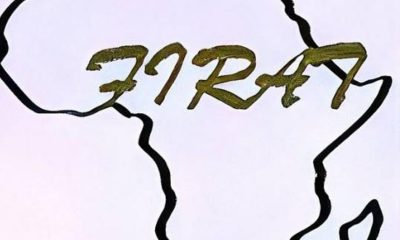
 News4 days ago
News4 days agoFIRAT Offers USD 200,000 SnapGenius Research Facility To Boost Research Excellence In African Universities
-

 News4 days ago
News4 days agoPolice Commence Investigation As Worshiper Mobbed To Death At Osogbo Central Mosque
-
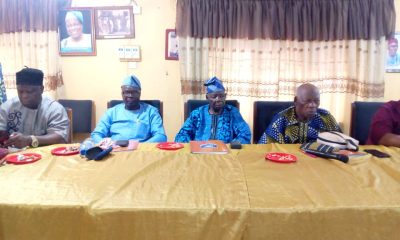
 News4 days ago
News4 days agoPensioners Threaten Legal Action Against States Over Unpaid Pension Increases, Outstanding Entitlements
-

 News4 days ago
News4 days agoAPC Obokun Feud : FAS Sues For Peace, Urges Party Members To Embrace Dialogue



